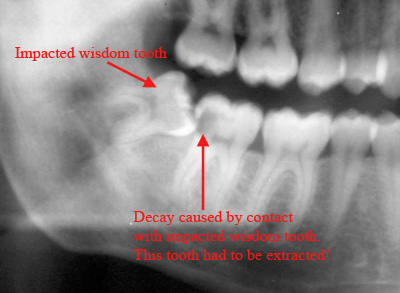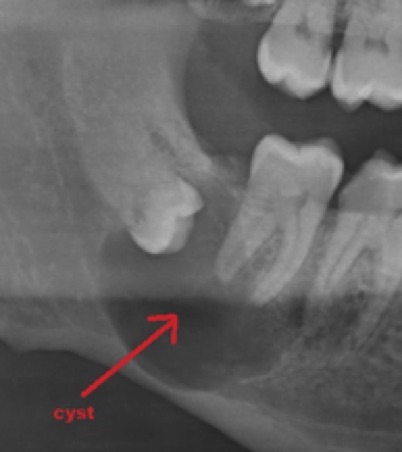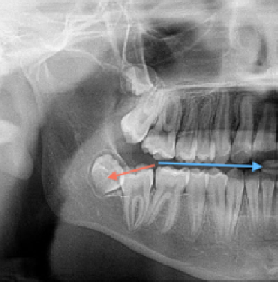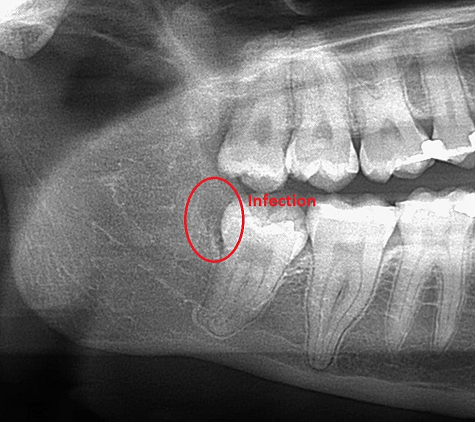Wisdom Teeth Removals
What Are Wisdom Teeth?
Wisdom teeth, or third molars, are the last set of permanent teeth to develop, typically emerging between the ages of 15 and 25. While some people may have no issues with their wisdom teeth, these late bloomers often cause a variety of oral health problems. From overcrowding and shifting teeth to pain, infections, and even nerve damage, wisdom teeth can significantly impact your smile and overall dental health.
It’s essential to address wisdom teeth early, ideally during the teenage years or early adulthood, to prevent complications. Even if your wisdom teeth haven’t yet emerged, they can still cause issues below the gum line, making it crucial to monitor and manage their development.
The Problems That Wisdom Teeth Can Cause

Erosion Cavity:
An erosion cavity occurs when a wisdom tooth presses against the neighboring molar, gradually wearing away the enamel and creating a vulnerable area prone to decay. This constant pressure can lead to a cavity forming between the two teeth, which often goes unnoticed until the infection sets in. As the cavity deepens, bacteria can infiltrate the area, leading to a painful infection that affects not only the wisdom tooth but also the adjacent molar. The damage can be extensive, requiring removal of the wisdom tooth to prevent further complications and preserve the health of the surrounding teeth. Early detection and intervention are crucial to stopping the progression of this hidden threat.
Cyst:
A cyst is a fluid-filled sac that can develop around an impacted wisdom tooth, although it is a relatively uncommon condition. When a cyst forms, it can silently and progressively destroy the bone around the wisdom tooth, undermining the structure and stability of the jaw. In more severe cases, the cyst can expand and cause significant damage to surrounding teeth, leading to tooth displacement or loss. The presence of a cyst is often painless in its early stages, making it difficult to detect without a thorough dental examination. If left untreated, the cyst can cause severe complications, necessitating not only the removal of the wisdom tooth but also additional procedures to repair the bone and restore oral health.


Crowding:
Crowding is a common issue that arises when a wisdom tooth doesn’t have enough space to properly emerge, leading it to push against the adjacent teeth. This pressure can cause the teeth to shift, resulting in a misaligned bite and a crowded appearance. Over time, this crowding can lead to discomfort, difficulty in cleaning the affected areas, and an increased risk of decay and gum disease. The impact of crowding goes beyond aesthetics, as it can also affect the function of your teeth and jaw. Removing the wisdom tooth can alleviate the pressure, prevent further misalignment, and help maintain the integrity of your smile.
Gum Infection:
Gum infection, also known as pericoronitis, occurs when an impacted wisdom tooth begins to break through the gum tissue. As the tooth emerges, it can create a flap of gum tissue where food particles and bacteria can easily become trapped. This can lead to inflammation and infection around the top of the tooth, causing symptoms such as pain, swelling, and difficulty opening the mouth. In severe cases, the infection can spread to other areas of the mouth or even into the bloodstream, posing a significant health risk. Removing the impacted wisdom tooth is often necessary to eliminate the source of the infection and prevent it from recurring, ensuring that your oral health is protected.


How Can I Get Started With Wisdom Teeth Surgery?
Dr. Dieu and the team at PREMIER ORAL & FACIAL SURGEY are here to guide you through every step of the wisdom tooth removal process. We offer a variety of anesthetic options to ease any anxiety you may have about the procedure. To schedule your consultation, call our office today at (302) 273-8300.
We’re committed to helping you achieve a healthy, pain-free smile.
Frequently Ask Questions
Why Should I Have My Wisdom Teeth Removed?
Removing wisdom teeth before they cause problems is key to maintaining a healthy, aligned smile. In many cases, there simply isn’t enough room in the mouth to accommodate these extra molars, leading to overcrowding, misalignment, and other serious complications. Wisdom teeth may grow in sideways, partially emerge, or remain impacted under the gum line, each scenario presenting its own set of challenges.
Potential Issues Caused by Wisdom Teeth:
- Overcrowding
- Jaw & Teeth Misalignment
- Jaw Damage
- Nerve Damage
- Tooth & Jaw Pain
- Gum Disease
- Infections
- Cysts
- Tooth Damage
What Are Impacted Wisdom Teeth?
Impacted wisdom teeth are those that are trapped beneath the gum line, either partially or fully. These teeth can cause significant oral health issues, even if they don’t visibly emerge. Impacted wisdom teeth come in several types, each with its own risks and potential complications:
Types of Wisdom Teeth Impaction:
- Vertical Impaction: When the tooth is too close to the neighboring tooth and becomes stuck beside it.
- Partial Impaction: The tooth begins to emerge but is obstructed by the adjacent tooth, often with a flap of gum tissue covering it.
- Horizontal Impaction: The tooth is trapped horizontally beneath the gum line.
- Soft Tissue Impaction: The tooth partially emerges from the jawbone but remains stuck under the gum.
- Bony Impaction: The tooth is fully concealed within the jawbone.
- Mesial Impaction: The tooth is improperly angled while erupting, causing pain to the neighboring tooth.
- Distal Impaction: The tooth is positioned away from the other teeth, moving toward the back of the mouth.
Should Wisdom Teeth Be Removed Even If They Haven’t Emerged?
Yes, removing wisdom teeth before they cause problems is strongly recommended. Even if they haven’t emerged or aren’t currently causing pain, wisdom teeth can lead to infections, impaction, and other complications down the road. Early removal is often easier and comes with shorter healing times, reducing the risk of overcrowding, cysts, misalignment, and other serious issues that may require extensive treatment later.
What Should I Expect During Wisdom Teeth Extraction?
At Premier Oral & Facial Surgery, we perform wisdom teeth removal in our state-of-the-art surgery center, equipped with the latest technology. With advancements in oral surgery, the procedure is now less invasive and recovery times are shorter. Dr. Dieu will carefully review your dental X-rays and develop a personalized treatment plan tailored to your needs.
Wisdom teeth extraction is typically performed under IV sedation to ensure your comfort. Once sedated, Dr. Dieu and his skilled surgical team will precisely and gently remove each wisdom tooth, minimizing discomfort and promoting a smooth recovery.
What Should I Expect After Wisdom Teeth Removal?
After your wisdom teeth extraction, it’s normal to feel drowsy as the anesthesia wears off. You’ll need someone to drive you home, as you won’t be able to operate machinery or drive until the effects have fully subsided. A nap upon returning home can help you recover from the anesthesia, leaving you more alert afterward.
In the days following surgery, you may experience mild swelling, bleeding, or discomfort. It’s essential to rest and follow our post-operative care instructions to support healing. You should avoid brushing your teeth until the day after surgery, at which point you can gently clean your teeth while avoiding the surgical sites. Applying an ice pack to your jaw can help reduce swelling, and sticking to a soft food diet will protect the surgical areas as they heal.
